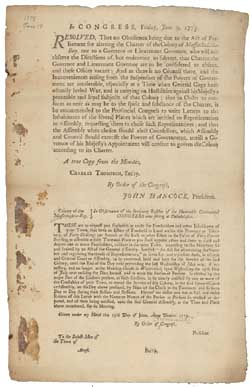In Congress, Friday, June 9, 1775 : Resolved, that no obedience being due to the act of Parliament for altering the charter of the colony of Massachusetts-Bay ...
To order an image, navigate to the full
display and click "request this image"
on the blue toolbar.
-
Choose an alternate description of this item written for these projects:
- Main description
[ This description is from the project: Coming of the American Revolution ]
Issued by the Massachusetts Provincial Congress on 9 June 1775, this broadside outlined the regulations passed on by the Continental Congress for establishing a civil government to take control of the colony. This followed former royal governor Thomas Gage's refusal to convene the Massachusetts legislature in 1774.
"General Gage hath actually levied war"
War breaks out in Massachusetts on 19 April 1775 when British regulars clash with minutemen in Concord and Lexington. The Massachusetts Provincial Congress is eager to mobilize an army, but they do not possess the necessary authority. (Massachusetts patriots formed a provincial congress when the colony's royal governor, General Thomas Gage, refused to convene the Massachusetts legislature in October 1774.) When the Continental Congress opens on 10 May, the Provincial Congress asks the body for advice on establishing a civil government to take control of the colony. Congress responds cautiously in order to appease more conservative delegates, passing a resolution on the matter in June 1775. The Provincial Congress quickly publishes a broadside to convey the news to every town in Massachusetts.
Questions to Consider
1. What is Congress' instruction to the Massachusetts Provincial Congress? Do they have permission to establish their own government?
2. What commentary does Congress offer concerning the governor and lieutenant governor of the colony?
3. How does the Massachusetts Provincial Congress respond to the news from the Continental Congress? What instructions do they offer, and to whom?
Further Exploration
4. Why might more conservative delegates to the Continental Congress be concerned about the colony of Massachusetts establishing its own government (to replace the royally appointed governor and government)?
5. Broadsides such as this one were a common method of spreading news and information in the eighteenth century. How do we spread similar political news or instructions today?

